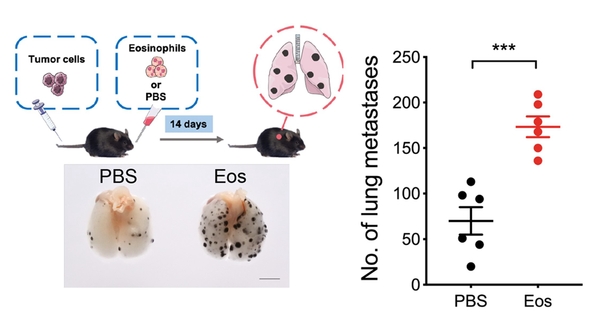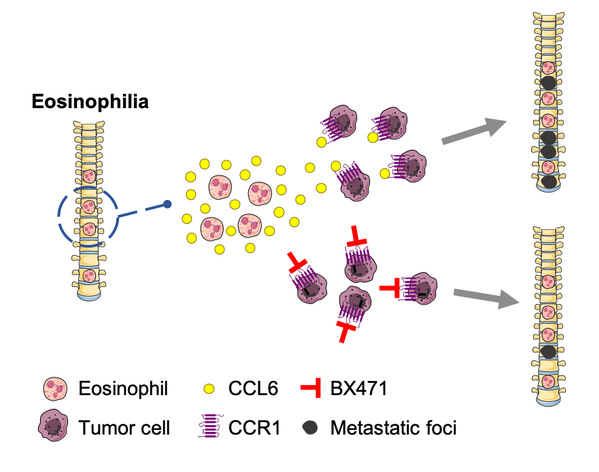Negative role of eosinophils in metastasis uncovered
Cancer metastasis, one of the challenges that the medical community faces, constitutes a severe health hazard for mankind. Recently, the research team led by Prof. SHEN Huahao and Prof. YING Songmin from the Key Laboratory of Respiratory Disease of Zhejiang Province, Department of Respiratory and Critical Care Medicine, the Second Affiliated Hospital Zhejiang University School of Medicine discovered that eosinophilic inflammation promotes metastatic tumor growth. This study offers a potential target for the therapy of metastatic disease. The findings were published in the journal Science Advances on May 26.
Eosinophils are a type of white blood cell. While accounting for less than 5% of the blood, they play a tremendous role, not only in killing bacteria and parasites but also in contributing to such allergic diseases as bronchial asthma.
In the early 1980s, scientists detected the increase of eosinophils in tumor-associated tissues in a variety of tumors, including lung cancer, and its relationship with the prognosis of patients, suggesting that eosinophils may well be involved in the development and progression of tumors. However, it is in recent years that basic research has gradually revealed eosinophils regulate tumor progression either by interacting directly with tumor cells or indirectly through the tumor microenvironment.
“However, most of these studies are concerned about the positive anti-tumor effect of eosinophils and only a few studies present opposing views. The role of eosinophils in tumors remains open to contention,” said YING.

Eosinophils promote tumor cell migration and metastasis formation
Cancer metastasis is a process by which malignant tumor cells travel from their primary sites to other sites for continued growth via lymphatic tracts, blood vessels, or body cavities.
“Cancer metastasis has to face many hurdles. Simply put, it needs to leave, stay and grow. Only when each step is successful can metastases form. Among them, metastatic colonization is a key part,” YING said, “Our team started to explore the role of eosinophils in the process of tumor cell colonization from experiments on inflammatory mice in 2016.”
“Researchers used to focus on the number of eosinophils in previous studies, so it was difficult to reach definitive conclusions,” said SHEN, “We used eosinophil-deficient mice and IL-5 transgenic mice, and discovered the relationship between eosinophils and tumor metastasis by observing the distinction between mice with and without eosinophils.”
Researchers found that eosinophils acted like magnets for tumor metastasis. In comparison with normal mice, the number of metastases in inflammatory mice increased by 3-5 times.

Schematic representation of the proposed mechanism
underlying eosinophilia-dependent metastasis
“Eosinophils are a double-edged sword in tumors. Their role in anti-tumor is dependent on specific stimuli in the microenvironment, such as IFN-γ-activated eosinophils. Only in this way can they play a positive role in killing tumor cells directly or regulating the anti-tumor immune response,” YING pointed out. “We should not ignore the detrimental role of eosinophils in allergic airway inflammation or non-activated states.”
“With the discovery of the role of eosinophils and key molecules in chronic airway inflammation and tumors, there is an urgent need to characterize important chemokine-receptor interactions and develop targeted drugs,” said SHEN, “In our follow-up study, we will validate experimental results in tumor patients with allergic diseases.”